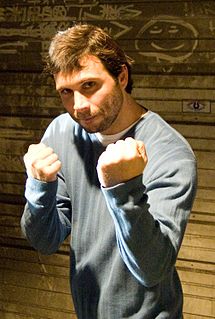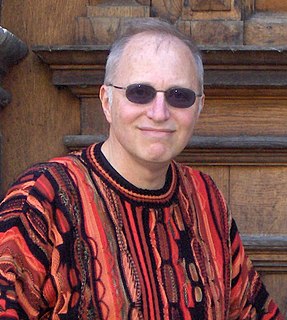A Quote by Jeremy Sisto
In 'Law & Order,' your main job is to stay out of the way of the plot. On another show you'd receive your script and see stuff that seems challenging and feel excited that the writers thought highly enough of you to write it for you.
Related Quotes
In animation, you may be working with 20 writers, and everybody has to write the same thing. You can't have episodes that don't feel like they belong. In comics, you're gonna write a whole run, which means it's your style that's coming through. But when you're working on a show that's collaborated with a dozen other writers, you have to have a style that blends the show together. So you can't write it the way you normally would, because your script will stand out from all the others.
I feel like being an actor it is a great way to do your job and be a parent, because you have a lot of freedom. You have a job and then the job ends and than maybe you don't have another job for a while or maybe you chose not have another job for a while. For an actor, it's like maybe you don't see your kid for two weeks while you are filming but then you might have three months off where you are at home every day and picking him up from school. I find it's a great thing.
Show people your stuff, listen carefully to their responses, but ultimately don't value anyone's opinion above your own. Be influenced by writers you dislike as well as writers you like. Read their stuff to figure out what's wrong. Find a balance between the confidence that allows you continue, and the self-critical facility that enables you to improve. Get the balance wrong on either side, and you're screwed.
If you think or say, 'I always get jetlag when I travel,' your cells receive 'jetlag' as a command, and they must carry out your instructions. Think and feel that you have a weight problem, and your cells receive the order of a weight problem. They must follow your instructions and keep your body in an overweight condition.
The way to find out about your happiness is to keep your mind on those moments when you feel most happy, when you really are happy-not excited, not just thrilled, but deeply happy. This requires a little bit of self analysis. What is it that makes you happy? Stay with it, no matter what people tell you. This is what I call "following your bliss."
It's probably unprecedented for a filmmaker simply to take the writers' script and treat it as the instructions on the package. What really happens is you pretty much suppress your own instincts - and your own views on the matter - and write things the way filmmakers would like to have them, though the filmmakers often don't know what they want. They can only find out by reading what you do.
My recommendation for SEO is very simple. It’s Write Good Stuff. In my mind, Google is in the business of finding good stuff. It has thousands of the smartest people in the world, spending billions of dollars to find the good stuff. All you have to do is write the good stuff; you don't need to trick it. Let Google do its job and you do your job.



































